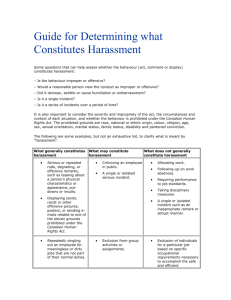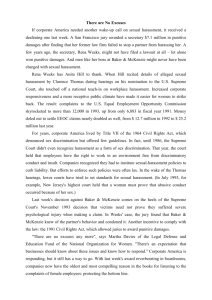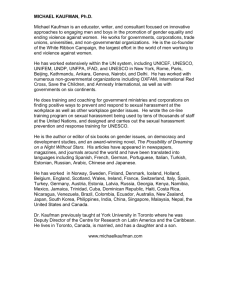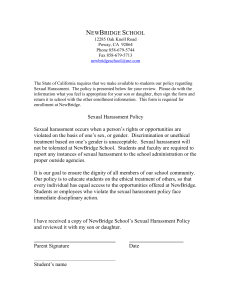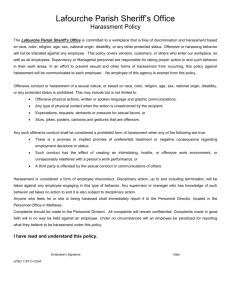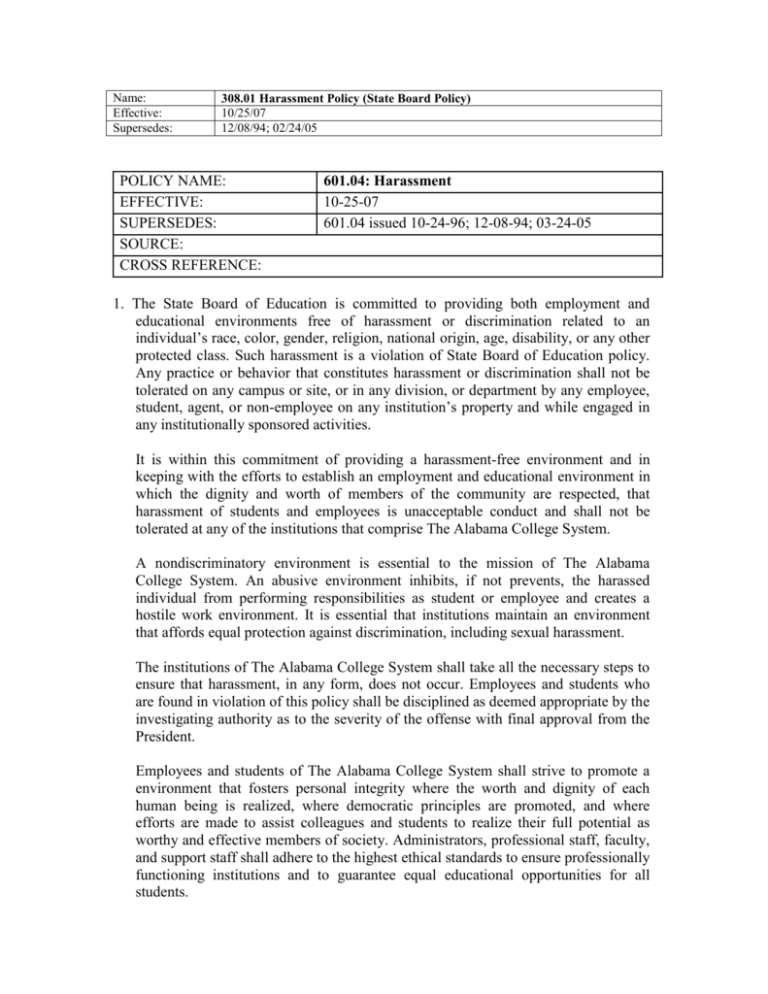
Name:
Effective:
Supersedes:
308.01 Harassment Policy (State Board Policy)
10/25/07
12/08/94; 02/24/05
POLICY NAME:
EFFECTIVE:
SUPERSEDES:
SOURCE:
CROSS REFERENCE:
601.04: Harassment
10-25-07
601.04 issued 10-24-96; 12-08-94; 03-24-05
1. The State Board of Education is committed to providing both employment and
educational environments free of harassment or discrimination related to an
individual’s race, color, gender, religion, national origin, age, disability, or any other
protected class. Such harassment is a violation of State Board of Education policy.
Any practice or behavior that constitutes harassment or discrimination shall not be
tolerated on any campus or site, or in any division, or department by any employee,
student, agent, or non-employee on any institution’s property and while engaged in
any institutionally sponsored activities.
It is within this commitment of providing a harassment-free environment and in
keeping with the efforts to establish an employment and educational environment in
which the dignity and worth of members of the community are respected, that
harassment of students and employees is unacceptable conduct and shall not be
tolerated at any of the institutions that comprise The Alabama College System.
A nondiscriminatory environment is essential to the mission of The Alabama
College System. An abusive environment inhibits, if not prevents, the harassed
individual from performing responsibilities as student or employee and creates a
hostile work environment. It is essential that institutions maintain an environment
that affords equal protection against discrimination, including sexual harassment.
The institutions of The Alabama College System shall take all the necessary steps to
ensure that harassment, in any form, does not occur. Employees and students who
are found in violation of this policy shall be disciplined as deemed appropriate by the
investigating authority as to the severity of the offense with final approval from the
President.
Employees and students of The Alabama College System shall strive to promote a
environment that fosters personal integrity where the worth and dignity of each
human being is realized, where democratic principles are promoted, and where
efforts are made to assist colleagues and students to realize their full potential as
worthy and effective members of society. Administrators, professional staff, faculty,
and support staff shall adhere to the highest ethical standards to ensure professionally
functioning institutions and to guarantee equal educational opportunities for all
students.
For these purposes, the term "harassment" includes, but is not necessarily limited
to:
Slurs, jokes, or other verbal, graphic, or physical conduct relating to an
individual's race, color, gender, religion, national origin, age, disability,
or any other protected class. Harassment also includes unwelcome sexual
advances, requests for sexual favors, and other verbal, graphic, or
physical contact if perceived as such by the recipient. Any contact
solicited during non-traditional business hours may be perceived as
harassment by recipient unless it is specifically associated with work
related duties.
2. Harassment of employees or students by non-employees is also a violation of this
policy. Any employee or student who becomes aware of any such harassment shall
report the incident(s) to the appropriate institution official. Failure to act, which
includes initial investigation, shall be deemed in direct violation of this policy.
3. Sexual harassment is a form of sex discrimination which is illegal under Title VII of the
Civil Rights Act of 1964 for employees and under Title IX of the Education
Amendments of 1972 for students. Sexual harassment does not refer to occasional
compliments; it refers to behavior of a sexual nature which interferes with the work or
education of its victims and their co-workers or fellow students. Sexual harassment may
involve the behavior of a person of either sex against a person of the opposite sex or the
same sex, and occurs when such behavior constitutes unwelcome sexual advances,
unwelcome requests for sexual favors, or other unwelcome verbal or physical conduct
of a sexual nature, when perceived by the recipient that:
3.1. Submission to such conduct is made either explicitly or implicitly a term or
condition of an individual’s employment or educational opportunities;
3.2. Submission to or rejection of such conduct is used as the basis for
employment or academic decisions affecting that individual;
3.3. Such conduct has the purpose or effect of unreasonably interfering with an
individual’s work or academic performance, or creates an intimidating,
hostile, or offensive work or educational environment. Any incident of
harassment shall be reported to the grievance officer as promptly as possible
after the harassment occurs.
4. The employees of the institutions within The Alabama College System determine the
ethical and moral tone for these institutions through both their personal conduct and
their job performance. Therefore, each employee must be dedicated to the ideals of
honor and integrity in all public and personal relationships. Relationships between
institution personnel of different ranks, including that of instructors and students, which
involve partiality, preferential treatment, or the improper use of position shall be
avoided. Further, such relationships may have the effect of undermining the atmosphere
of trust on which the educational process depends. Implicit in the idea of
professionalism is the recognition by those in positions of authority that in their
relationships with students or employees there is always an element of power. It is
incumbent on those with authority not to abuse the power with which they are
entrusted.
All personnel shall be aware that any romantic relationship (consensual or otherwise) or
any otherwise inappropriate involvement with another employee or student makes them
liable for formal action against them if a complaint is initiated by the aggrieved party in
the relationship. Even when both parties have consented to the development of such a
relationship, it is the supervisor in a supervisor-employee relationship, the faculty
member in a faculty-student relationship, or the employee in an employee-student
relationship who shall be held accountable for unprofessional behavior.
5. This policy encourages faculty, students, and employees who believe that they have
been the victims of harassment to contact the grievance officer or other appropriate
official at the institution where the alleged incident occurred. Any reprisals shall be
reported immediately to the grievance officer or other appropriate official.
6. This policy shall be distributed, communicated and implemented in a manner which
provides all interested parties the opportunity to be informed of this policy. A systemwide educational program shall be utilized to assist all members of the community to
understand, prevent and combat harassment.
7. A harassment educational program may consist of seminars, workshops, videos, and/or
printed materials. The educational elements of this policy seek to achieve the following
goals through dissemination of this policy and providing a training program by: (1)
ensuring that all administrators, faculty, students, and all employees are made aware of
their rights concerning sexual harassment; (2) notifying individuals of conduct that is
prohibited; (3) informing administrators and supervisors about the proper procedures in
addressing complaints. This program must be administered annually and approved by
Department of Postsecondary Education.
8. The Chancellor will issue guidelines to ensure the adherence to, implementation of, and
enforcement of this policy.

